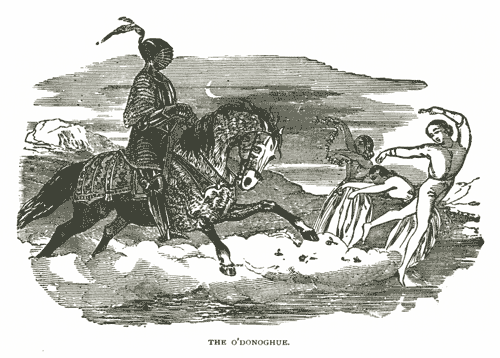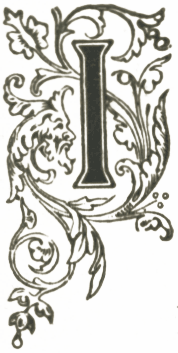The Legend of O'Donoghue - Fairy Legends of Ireland


N an age so distant that the precise period is unknown, a chieftain named O'Donoghue ruled over the country which surrounds the romantic Lough Lean, now called the lake of Killarney. Wisdom, beneficence, and justice distinguished his reign, and the prosperity and happiness of his subjects were their natural results.
He is said to have been as renowned for his warlike exploits as for his pacific virtues; and as a proof that his domestic administration was not the less rigorous because it was mild, a rocky island is pointed out to strangers, called “O'Donoghue's Prison,” in which this prince once confined his own son for some act of disorder and disobedience.
His end—for it cannot correctly be called his death—was singular and mysterious.
At one of those splendid feasts for which his court was celebrated, surrounded by the most distinguished of his subjects, he was engaged in a prophetic relation of the events which were to happen in ages yet to come.
His auditors listened, now wrapt in wonder, now fired with indignation, burning with shame, or melted into sorrow, as he faithfully detailed the heroism, the injuries, the crimes, and the miseries of their descendants.
In the midst of his predictions he rose slowly from his seat, advanced with a solemn, measured, and majestic tread to the shore of the lake, and walked forward composedly upon its unyielding surface.
When he had nearly reached the centre he paused for a moment, then, turning slowly round, looked towards his friends, and waving his arms to them with the cheerful air of one taking a short farewell, disappeared from their view.
The memory of the good O'Donoghue has been cherished by successive generations with affectionate reverence; and it is believed that at sunrise, on every May-day morning, the anniversary of his departure, he revisits his ancient domains: a favoured few are in general permitted to see him, and this distinction is always an omen of good fortune to the beholders; when it is granted to many it is a sure token of an abundant harvest—a blessing, the want of which during this prince's reign was never felt by his people.
Some years have elapsed since the last appearance of O'Donoghue.
The April of that year had been remarkably wild and stormy; but on May-morning the fury of the elements had altogether subsided.
The air was hushed and still; and the sky, which was reflected in the serene lake, resembled a beautiful but deceitful countenance, whose smiles, after the most tempestuous emotions, tempt the stranger to believe that it belongs to a soul which no passion has ever ruffled.
The first beams of the rising sun were just gilding the lofty summit of Glenaa, when the waters near the eastern shore of the lake became suddenly and violently agitated, though all the rest of its surface lay smooth and still as a tomb of polished marble, the next moment a foaming wave darted forward, and, like a proud high-crested warhorse, exulting in his strength, rushed across the lake toward Toomies mountain.
Behind this wave appeared a stately warrior fully armed, mounted upon a milk-white steed; his snowy plume waved gracefully from a helmet of polished steel, and at his back fluttered a light blue scarf.
The horse, apparently exulting in his noble burden, sprung after the wave along the water, which bore him up like firm earth, while showers of spray that glittered brightly in the morning sun were dashed up at every bound.
The warrior was O'Donoghue; he was followed by numberless youths and maidens, who moved lightly and unconstrained over the watery plain, as the moonlight fairies glide through the fields of air; they were linked together by garlands of delicious spring flowers, and they timed their movements to strains of enchanting melody.
When O'Donoghue had nearly reached the western side of the lake, he suddenly turned his steed, and directed his course along the wood-fringed shore of Glenaa, preceded by the huge wave that curled and foamed up as high as the horse's neck, whose fiery nostrils snorted above it.
The long train of attendants followed with playful deviations the track of their leader, and moved on with unabated fleetness to their celestial music, till gradually, as they entered the narrow strait between Glenaa and Dinis, they became involved in the mists which still partially floated over the lakes, and faded from the view of the wondering beholders: but the sound of their music still fell upon the ear, and echo, catching up the harmonious strains, fondly repeated and prolonged them in soft and softer tones, till the last faint repetition died away, and the hearers awoke as from a dream of bliss.

